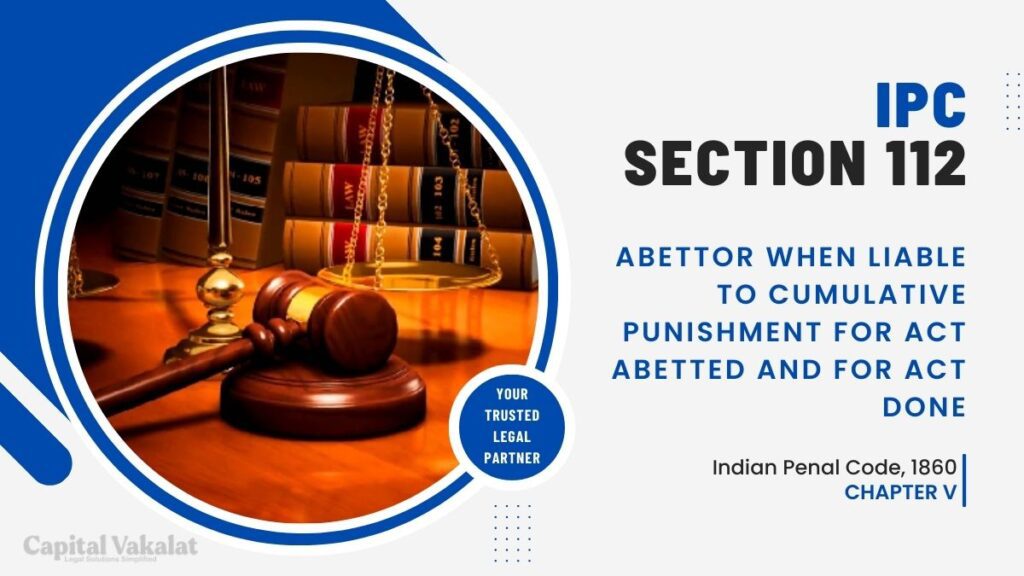In the intricate legal landscape of India, the Indian Penal Code (IPC) plays a pivotal role in defining offenses and their punishments. Section 112 of the IPC delves into the notion of cumulative punishment for an abettor, concerning both the act abetted and the act carried out.

This article aims to comprehensively explore Section 112 IPC, its interpretations, and its relevance in the contemporary legal scenario.
Understanding Abetment in IPC
Before delving into Section 112 IPC, it is crucial to understand the concept of abetment. Abetment refers to the act of instigating, engaging, or aiding someone to commit a crime. This is a crucial aspect of criminal law, as abetment is often the precursor to various criminal acts.
Section 112 IPC: A Closer Look
Section 112 of the Indian Penal Code provides insight into the liabilities of an abettor when it comes to cumulative punishment. It addresses the situation where an individual is liable for both the abetted act and the act that has been executed. This section plays a significant role in ensuring justice and accountability in the legal system.
When Does Cumulative Punishment Apply?
Cumulative punishment under Section 112 IPC is applicable when the abettor’s actions result in the commission of the crime they have abetted. In such cases, the abettor can be held liable for both the abetted act and the act carried out by the principal offender. This provision serves as a deterrent against individuals who might encourage or facilitate criminal activities.
Case Examples
To better understand Section 112 IPC, let’s consider some case examples. In cases of robbery, if an individual provides information and resources to the principal offender, they can be considered an abettor. If the robbery takes place and the abettor is proven to have played a substantial role, they can be held liable for both abetment and the robbery itself.
Key Provisions of Section 112
Section 112 IPC contains specific provisions that guide the legal process. It mandates that if the abetted act and the act itself are committed simultaneously or in furtherance of the same goal, the abettor is liable for both offenses. This ensures that individuals who incite or support crimes are not exempt from punishment.
Legal Interpretations
The legal community has various interpretations of Section 112 IPC. Some argue that it is a necessary provision to hold abettors accountable for their actions, while others contend that it can lead to excessive punishment. Legal interpretations often depend on the specific circumstances of each case.
The Role of Intent
One crucial aspect of Section 112 IPC is intent. To be held liable for cumulative punishment, the abettor must have had the intention that the act abetted should be committed. Proving intent can be complex, as it often relies on circumstantial evidence.
Constitutional Perspective
Section 112 IPC has a constitutional aspect as well. It must conform to the principles of natural justice and fairness. The Constitution of India ensures that individuals receive a fair trial and that excessive punishment is avoided.
Controversies Surrounding Section 112
As with many legal provisions, Section 112 IPC is not without its controversies. Some argue that it may lead to disproportionate punishment, especially in cases where the abettor’s role was minimal. The debate continues on striking a balance between accountability and proportionality.
The Importance of Fair Trial
Fair trial is an essential element of any legal system. In cases involving Section 112 IPC, ensuring that the abettor receives a fair trial and is not subjected to unjust punishment is paramount. This underlines the significance of due process.
Relevance in Modern Legal Context
In the contemporary legal context, Section 112 IPC remains relevant in holding individuals accountable for their involvement in criminal activities. With the increasing complexity of crimes, the need for such provisions persists.
Criticisms and Reforms
Over the years, Section 112 IPC has faced criticisms for potential misuse and disproportionate punishment. Legal experts and lawmakers continue to debate reforms that could strike a balance between accountability and fairness.
Conclusion
Section 112 of the Indian Penal Code serves as a critical element in holding abettors accountable for their actions. While it has its share of controversies, it remains a significant tool in maintaining the integrity of the legal system. The law must continue to evolve to address the complexities of modern-day crimes while upholding the principles of justice and fairness.
FAQs
Is intent a crucial element in determining liability under Section 112?
Yes, the abettor’s intent to commit the abetted act is a fundamental aspect of liability under Section 112 IPC.
Are there any proposed reforms to Section 112 IPC?
Reforms to Section 112 IPC have been a subject of debate, but there are no specific reforms in place as of now.
How does Section 112 IPC ensure a fair trial for abettors?
Section 112 IPC underscores the importance of a fair trial and adherence to the principles of natural justice.
Can an abettor escape liability if the abetted act is not carried out?
If the abetted act is not committed, the abettor may not be held liable under Section 112 IPC.